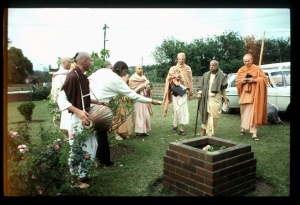CC Madhya 14.188: Difference between revisions
No edit summary |
(Vanibot #0054 edit - transform synonyms into clickable links, which search similar occurrences) |
||
| Line 17: | Line 17: | ||
<div class="synonyms"> | <div class="synonyms"> | ||
''lajjā'' | ''[//vanipedia.org/wiki/Special:VaniSearch?s=lajjā&tab=syno_o&ds=1 lajjā]'' — timidity; ''[//vanipedia.org/wiki/Special:VaniSearch?s=harsa&tab=syno_o&ds=1 harsa]'' — jubilation; ''[//vanipedia.org/wiki/Special:VaniSearch?s=abhilāṣa&tab=syno_o&ds=1 abhilāṣa]'' — ambition; ''[//vanipedia.org/wiki/Special:VaniSearch?s=sambhrama&tab=syno_o&ds=1 sambhrama]'' — respect; ''[//vanipedia.org/wiki/Special:VaniSearch?s=vāmya&tab=syno_o&ds=1 vāmya]'' — ''characteristics of the left-wing ''gopīs; ''[//vanipedia.org/wiki/Special:VaniSearch?s=bhaya&tab=syno_o&ds=1 bhaya]'' — fear; ''[//vanipedia.org/wiki/Special:VaniSearch?s=eta&tab=syno_o&ds=1 eta]'' — these; ''[//vanipedia.org/wiki/Special:VaniSearch?s=bhāva&tab=syno_o&ds=1 bhāva]'' — ''ecstatic symptoms; ''[//vanipedia.org/wiki/Special:VaniSearch?s=mili’&tab=syno_o&ds=1 mili’]'' — coming together; ''[//vanipedia.org/wiki/Special:VaniSearch?s=rādhāya&tab=syno_o&ds=1 rādhāya]'' — Śrīmatī Rādhārāṇī; ''[//vanipedia.org/wiki/Special:VaniSearch?s=cañcala&tab=syno_o&ds=1 cañcala] [//vanipedia.org/wiki/Special:VaniSearch?s=karaya&tab=syno_o&ds=1 karaya]'' — agitate. | ||
</div> | </div> | ||
Latest revision as of 21:46, 19 February 2024

His Divine Grace
A.C. Bhaktivedanta Swami Prabhupada
A.C. Bhaktivedanta Swami Prabhupada
TEXT 188
- lajjā, harṣa, abhilāṣa, sambhrama, vāmya, bhaya
- eta bhāva mili’ rādhāya cañcala karaya
SYNONYMS
lajjā — timidity; harsa — jubilation; abhilāṣa — ambition; sambhrama — respect; vāmya — characteristics of the left-wing gopīs; bhaya — fear; eta — these; bhāva — ecstatic symptoms; mili’ — coming together; rādhāya — Śrīmatī Rādhārāṇī; cañcala karaya — agitate.
TRANSLATION
Svarūpa Dāmodara said, “Timidity, jubilation, ambition, respect, fear and the characteristics of the left-wing gopīs are all ecstatic symptoms that combine to agitate Śrīmatī Rādhārāṇī.
PURPORT
This is explained in the following verse, which is found in the Govinda-līlāmṛta (9.11).